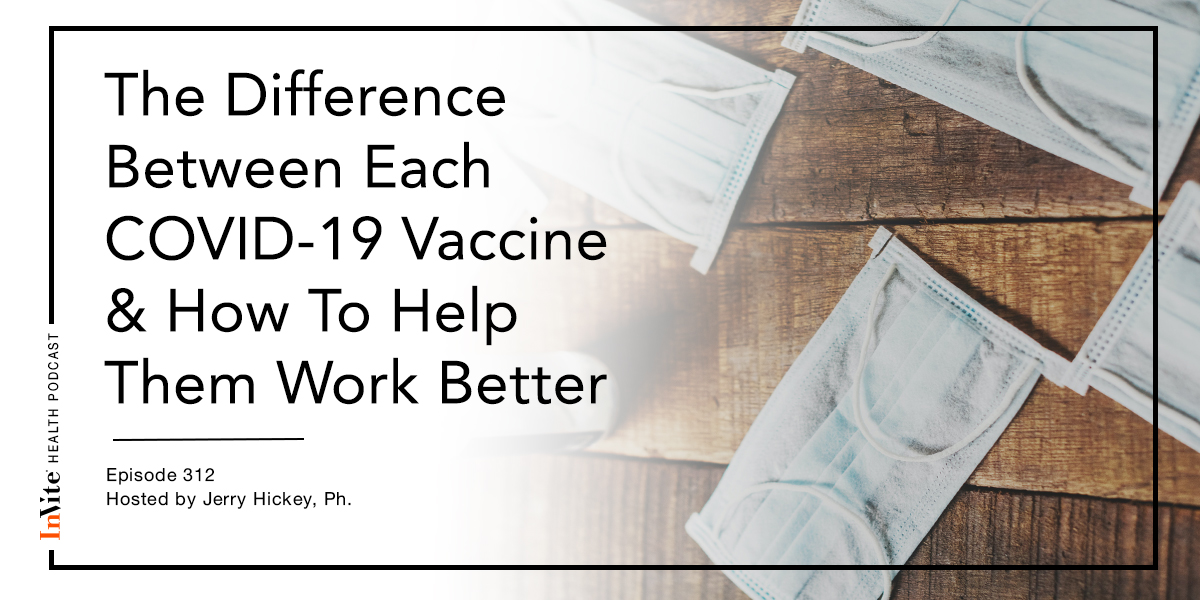The Difference Between Each COVID-19 Vaccine & How To Help Them Work Better – InVite Health Podcast, Episode 312

Vaccine
Invite Health Podcast, Episode hosted by Jerry Hickey. Ph
Subscribe Today!
A number of clients have inquired how the three COVID-19 vaccines compare. There are no head-to-head trials, but we can still go over the key characteristics of each. I’ll do a follow-up on how to make your vaccines more effective, including nutritional supplements.
Pfizer
The vaccine my wife and I received is the Pfizer-BioNTech vaccine. It’s an mRNA vaccine. That’s its mechanism of action, how it works. You have DNA, which is the template for everything that happens in your body. Messenger RNA, or mRNA, are the workers that transcribe everything. For the vaccine, they take some messenger RNA and this causes immune cells to create antibodies to the COVID-19 virus. The messenger RNA quickly is destroyed so there’s no lasting problem. It’s turning out to be very safe.†
They normally give two doses. You get your first and second doses three weeks apart. Seven days after your second immunization, you’re 95% resistant. The original trial was on almost 44,000 people aged 16 and up. The most common side effect is fatigue and minor headaches, both being more prominent after the second dose. With the first dose, you get a little muscle pain, but that goes away in about two days. By the second dose, you’ve built up some antibodies, so when you get the second dose, your body reacts more to it. Generally, these side effects are milder for people over the age of 55 than for younger people. Severe reactions to the Pfizer vaccine and the Moderna vaccine are extremely rare and most of them occur in women, which scientists are speculating is due to the fact that women have to X chromosomes. A lot of immune-related genes are imprinted on the X chromosome, so that could be why women have more of a reaction to the immunization.†
Get Vaccine Ready With These Nutrients – InVite Health Podcast, Episode 308. Listen Now >>
Moderna
What about the Moderna vaccine? That’s also a messenger RNA vaccine, where they take a little bit of RNA and it imprints the ability to create antibodies within your cells. Normally it’s two doses that are 28 days apart.†
When is it effective? Two weeks after your second dose, it’s about 94% effective, so the Pfizer one works a little bit faster. The original trial was on about 31,000 people aged 18 and over. What about the side effects? Overall, a fever, chills, headache and myalgia. Myalgia is deep muscle pain. 60% of participants after the first dose and 80% of participants after the second dose had some side effects, so it seems the reactions are a little more in the Moderna, but still not an issue.†
Johnson & Johnson
Let’s discuss the Johnson & Johnson Janssen vaccine. That’s an adenovirus vector vaccine. They take a different virus, a non-COVID-19-related virus, and they modify that virus. This virus can’t infect you. None of these three immunizations can cause an infection. They can cause a mild reaction, but not an infection. This modified virus delivers the instructions to create antibodies to COVID-19. The Johnson & Johnson is one dose, although they’re looking into doing a two-dose regimen.†
How well does it work? 72% efficacy in the United States strains, 66% globally against moderate to severe disease and 85% effective against severe disease. You have pretty good resistance after 28 days after that single dose. The original trial was on about 44,000 people aged 18 and up. The most common side effect is headaches. 39% of people in the study had a headache, 38% had fatigue, 33% had myalgia, 14% had nausea and 9% had fever.†
Tune into the full podcast episode for more details on these immunizations and their impacts on various COVID-19 strains.
Diet and lifestyle choices that can impact vaccine efficacy
What are some things that may prevent the immunizations from working properly?†
- A lot of alcohol
- Lack of sleep
- Anti-inflammatory drugs like ibuprofen and aspirin
- Powerful anti-inflammatory nutrients like well-absorbed turmeric and devil’s claw
- Stress and anxiety
What are some supplements and nutrients that can help improve the efficacy of the vaccines?†
- Antioxidants
- Fiber
- Probiotic bacteria
- Vitamin D
- Vitamin A
- Melatonin and good quality sleep
For more detailed recommendations about how these habits and nutrients can either harm or help the efficacy of your vaccine, listen to the full podcast episode.
Thank you for tuning in to the Invite Health Podcast. You can find all of our episodes for free wherever you listen to podcasts or by visiting www.invitehealth.com/podcast. Make sure you subscribe and leave us a review! Follow us on Facebook, Twitter and Instagram at Invite Health today. We’ll see you next time on another episode of the Invite Health Podcast.

